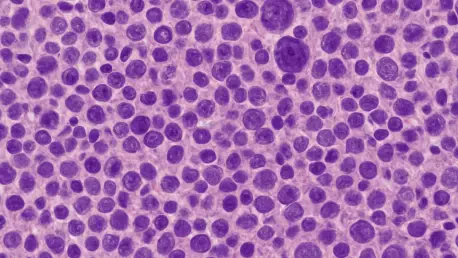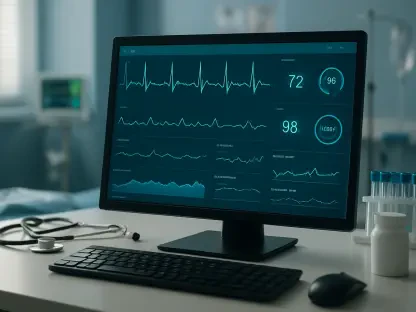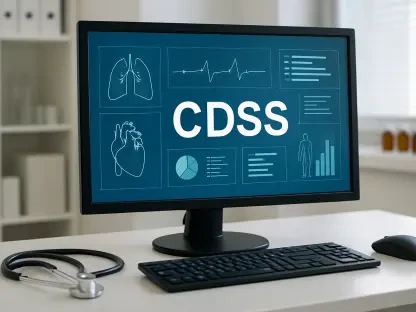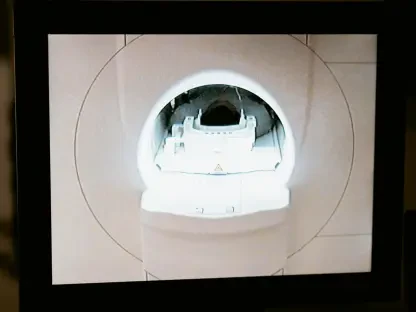In a remarkable stride forward for cancer diagnostics, Foresight Diagnostics has forged a pivotal licensing agreement with Roche Molecular Systems and Roche Sequencing Systems, announced on September 1 of this year. This collaboration focuses on Foresight’s cutting-edge Phased Variant Enrichment and Detection by Sequencing (PhasED-Seq) technology, with a specific emphasis on applications for Non-Hodgkin’s Lymphoma (NHL), a significant type of blood cancer. Beyond the technical aspects, this deal resolves a legal contention that once stood between the parties, transforming potential conflict into a partnership aimed at advancing precision medicine. The implications of this agreement extend far beyond the immediate stakeholders, promising enhanced diagnostic tools that could redefine patient care for those battling NHL. As the biotechnology landscape continues to evolve, such alliances highlight the power of collaboration in addressing complex medical challenges and improving outcomes for patients worldwide.
Unpacking the Strategic Alliance
Details of the Licensing Arrangement
This partnership’s core lies in a carefully structured licensing deal that grants Roche a limited, royalty-bearing, non-exclusive sublicense to utilize specific patents tied to PhasED-Seq technology. The focus is narrow but impactful, allowing Roche to develop in vitro diagnostic (IVD) kits exclusively for NHL applications. This arrangement ensures that while Roche gains access to a transformative diagnostic tool, Foresight retains overarching control over its intellectual property, which remains originally owned by Stanford University. Such a setup not only protects Foresight’s broader mission in cancer diagnostics but also enables Roche to contribute specialized solutions for blood cancer patients. The royalty-bearing aspect introduces a financial dimension that could influence the eventual pricing of diagnostic kits, yet it reflects a balanced compromise where innovation is rewarded while access is facilitated for targeted medical needs.
The significance of this deal extends into the realm of strategic positioning within the biotech industry. By delineating clear boundaries for Roche’s use of the technology, Foresight maintains its ability to explore other applications and partnerships, potentially across different cancer types or diagnostic challenges. This flexibility is crucial in a field where rapid advancements demand adaptability. Moreover, the agreement underscores a model of intellectual property management where academic origins, commercial licensing, and industry application converge. For patients and clinicians, the development of NHL-specific IVD kits could translate into more precise monitoring and earlier interventions, ultimately aiming to improve survival rates and quality of life for those affected by this challenging disease.
Navigating Past Legal Challenges
The backdrop to this licensing agreement includes a legal dispute initiated by Roche in July of the previous year against Foresight and Stanford University, centered on allegations of trade secret misappropriation. The lawsuit raised concerns about the ethical boundaries of innovation, claiming that proprietary information was used improperly in developing competing cancer-detection technologies. However, the resolution through this licensing deal marks a significant shift, with all claims dismissed and a clear path forward established. This outcome prioritizes collaborative progress over prolonged litigation, reflecting a pragmatic approach to resolving disputes in a highly competitive sector. It also sends a message about the importance of dialogue and negotiation in preserving the focus on patient-centric outcomes.
Beyond the immediate resolution, this legal settlement sheds light on the complexities of intellectual property in biotechnology. The high stakes of developing cutting-edge diagnostic tools often lead to friction between innovation and ownership rights, especially when academic researchers and commercial entities are intertwined. The decision to settle through a licensing framework rather than courtroom battles suggests an industry trend toward finding mutually beneficial solutions. For stakeholders in cancer diagnostics, this resolution ensures that resources and energy are redirected toward advancing technology and improving access to life-saving tools, rather than being consumed by legal entanglements. It’s a reminder of how strategic agreements can turn potential setbacks into opportunities for growth and impact.
Innovations in Cancer Detection
Core Mechanics of PhasED-Seq Technology
At the heart of this partnership lies PhasED-Seq, a revolutionary sequencing method designed to detect genetic mutations with unprecedented accuracy. The technology operates by identifying two distinct non-reference events within a single DNA molecule, a dual-detection approach that drastically reduces false positives compared to traditional methods. This precision enables the differentiation of tumor-derived cell-free DNA (ctDNA) from healthy DNA at concentrations below one part-per-million. Such sensitivity is particularly critical in minimal residual disease (MRD) monitoring, where even minute traces of cancer DNA can indicate recurrence or progression. The implications for early detection and timely intervention are profound, potentially transforming how clinicians manage patient care in oncology.
The robustness of PhasED-Seq is further evidenced by its validation across numerous patient samples, establishing a reliable foundation for clinical application. Unlike older sequencing technologies that struggle with noise and error rates, this method offers a clearer picture of a patient’s cancer status, even in the earliest stages of relapse. For diseases like NHL, where monitoring disease progression is vital, PhasED-Seq provides a tool that could significantly enhance decision-making for treatment plans. The technology’s ability to cut through diagnostic ambiguity positions it as a cornerstone for precision medicine, where tailored approaches based on individual genetic profiles become the standard rather than the exception. This innovation is poised to set new benchmarks in diagnostic accuracy.
Real-World Applications and Clinical Trials
Foresight has built on PhasED-Seq with its MRD platform and the Foresight CLARITY assay, a laboratory-developed test designed to measure MRD with exceptional sensitivity across both blood cancers like NHL and solid tumors. These tools deliver actionable insights that empower healthcare providers and biopharmaceutical companies to craft personalized treatment strategies. The ability to detect cancer at such low levels means that relapses can be caught earlier, potentially before clinical symptoms emerge, allowing for quicker therapeutic adjustments. This capability not only improves patient outcomes but also supports drug development by providing precise data on treatment efficacy during clinical trials, making it a dual-purpose innovation.
Further demonstrating the practical impact of PhasED-Seq, Foresight launched the PRECISE-HL trial in March of this year in collaboration with academic institutions. This study focuses on personalized treatment for advanced-stage classical Hodgkin lymphoma (cHL), testing how PhasED-Seq can guide therapeutic decisions in real-world settings. The trial represents a critical step toward clinical validation, bridging the gap between laboratory innovation and bedside application. By targeting specific blood cancers, the research underscores the technology’s potential to address unmet needs in oncology, offering hope for more effective management of diseases that have historically been challenging to monitor. Such initiatives highlight the transformative role that advanced diagnostics can play in reshaping patient care.
Broader Horizons in Biotech
Advancing Precision Medicine Through Partnerships
The collaboration between Foresight and Roche mirrors a larger trend in the biotechnology sector toward precision medicine, where diagnostic tools are increasingly tailored to detect specific genetic markers or mutations unique to individual patients. PhasED-Seq’s capacity to identify ctDNA at extraordinarily low levels aligns perfectly with this shift, offering the potential for earlier relapse detection and more customized treatment plans. This partnership exemplifies how academic research, startup innovation, and established pharmaceutical expertise can converge to accelerate advancements. Despite occasional conflicts over intellectual property, as seen in the initial legal dispute, the resolution through licensing agreements points to a maturing industry that values synergy over rivalry.
Additionally, the interplay between entities like Stanford University, Foresight, and Roche highlights the growing importance of collaborative ecosystems in medical technology. These alliances facilitate the transition of groundbreaking research from academic labs to commercial products that reach patients. However, challenges such as ensuring equitable access to such advanced diagnostics persist, as the costs associated with royalty-bearing licenses could influence affordability. Nevertheless, the trend toward precision medicine continues to gain momentum, driven by technologies that enable deeper insights into disease mechanisms. This partnership serves as a model for how shared goals can overcome barriers and push the boundaries of what’s possible in healthcare.
Addressing Critical Needs in Blood Cancer Care
The specific focus on NHL within this agreement addresses a pressing area of medical need, as blood cancers often require highly sensitive tools for effective monitoring of disease progression and therapeutic response. The development of IVD kits by Roche using PhasED-Seq technology holds promise for improving clinical outcomes by enabling earlier and more accurate detection of residual disease. For patients, this could mean the difference between timely intervention and delayed treatment, a factor that significantly impacts survival rates. The emphasis on NHL also reflects a strategic choice to target diseases where diagnostic innovation can have an outsized impact, given the complexity of managing such conditions.
Moreover, the attention to blood cancers like NHL underscores the broader challenge of unmet needs in oncology, where diagnostic gaps can hinder optimal care. The potential for PhasED-Seq to integrate into routine clinical practice through IVD kits could standardize high-sensitivity testing, making advanced diagnostics more accessible to healthcare providers. While hurdles such as cost and regulatory approval remain, the commitment to this area signals a dedication to tackling some of the toughest challenges in cancer care. As more partnerships form around similar goals, the cumulative effect could be a significant leap forward in how blood cancers are detected and managed, ultimately benefiting patients who face these life-altering diagnoses.









